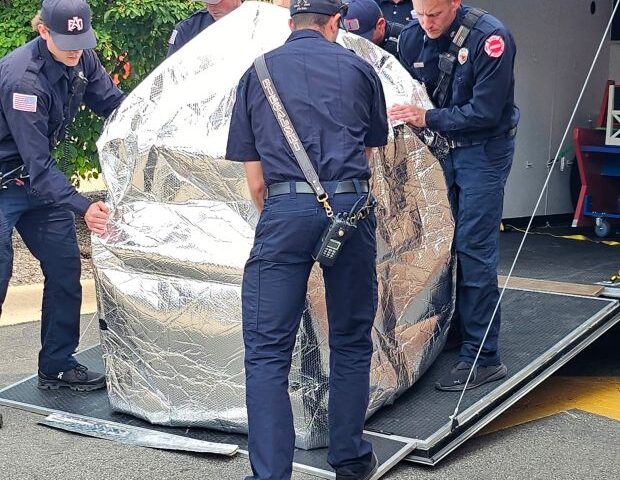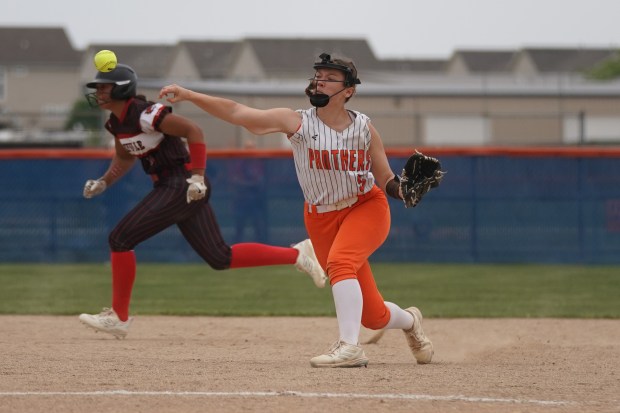It’s hard to imagine Gold Star Father Bob Patterson describing himself as “one of the lucky ones.”
Until you hear the North Aurora man explain why.
“I know what happened to my son,” he says, referring to Christopher Patterson, a graduate of West Aurora High School who was killed at age 20 by an IED in Afghanistan on Jan. 6, 2012.
“I know where he is … we got to bring him home.”
That’s not the case, however, for the thousands of POW/MIAs whose families, even decades later, don’t know how their loved ones died or where their remains are located.
For that reason, Patterson is heading up a project with Rolling Thunder, Illinois Chapter 1 that will “make sure these local heroes are not forgotten” by naming parts of our roads in their honor.
The group is currently working on “four local heroes to start,” he told me, with the idea to “have as many people and organizations as possible become involved.”
Those fallen warriors include Staff Sgt. Robert Herreid, a popular star athlete and 1965 Mooseheart graduate who enlisted in the Army and became a demolition expert with special forces in the Vietnam War.
Three months after being deployed, on Oct. 10, 1968, the 21-year-old soldier was reported missing in action in the Chau Doc Province of South Vietnam, and was officially declared dead on Jan. 30, 1974.
The young man whom family and friends described as the “All-American boy” did not even have a proper burial here in this country or anywhere. But Herreid did eventually get his name on a stone bench outside the Plano American Legion, is honored at the Veterans Memorial at Phillips Park in Aurora and was named to Mooseheart’s Sports Hall of Fame and as a Distinguished Alumni there.
And soon, thanks to Patterson’s committee, which is working with Marine veteran and state Rep. Stephanie Kifowit, D-Oswego, he will have part of Route 31 – from Mooseheart Road to Main Street in Batavia – named in his honor.
“The process is going through the General Assembly to give proper recognition to these heroes,” said Kifowit. “I am honored to work with Gold Star Father Bob Patterson on this initiative.”
As of now, I can share with you more about Herreid because in 2017 I wrote about the push by one of his best friends from Moosheart to get the U.S. government to do more to find his remains which, by some accounts, were buried by villagers on orders from the Viet Cong after his body lay on the ground for several days.
Hopefully, as family members are brought into this project, there will be more details about the lives of the other three to be honored, all casualties of the Korean War.
They include Army Sgt. First Class Ogden Neil Thompson of Aurora, 20, who was with the 8th Cavalry Regiment when he was declared missing in action on Nov. 1, 1950, while fighting the enemy near Unsan, North Korea, and declared presumed dead Dec. 31, 1954.
Route 25 from Sullivan Road to Ashland Avenue will be dedicated in his memory.
Pvt. First Class Wayne Wilder Hill Jr. – known as Sonny – was a West Aurora High School graduate who joined the Army in 1949 and was part of the 34th Infantry Regiment when he was taken prisoner while fighting near Taejon, South Korea, on July 20, 1950. The POW was murdered in a tunnel near Sunchon, North Korea, on Oct. 20, 1950, according to reports, and his remains were never recovered.
The stretch of Route 31 from Sullivan Road to Ashland Avenue will be named in his honor.
Army Sgt. First Class Theodore Alexander Katsoolias of West Chicago was a member of B Company of the 1st Battalion who became missing during a fierce battle with the Chinese Communist forces during the Korean War.
The stretch of road in his honor will be on Route 59 between Routes 38 and 64.
While there are no set dates on when these dedications will take place, Patterson is looking to get the word out so that schools and other groups will get involved. And his committee continues to reach out to the family members of these fallen heroes to include them in the project.
As a Gold Star father he knows how much it meant when the stretch of Route 31 that passes through North Aurora was named in his son’s honor in 2016.
It was about 18 months ago, Patterson told me, that he and wife Mary bought a motorcycle and joined Rolling Thunder, which is dedicated to bringing full accountability for POW-MIAs of our nation’s wars.
“We will not forget” is their watchword, which is exactly why this project is so important, he insists.
According to the U.S. Department of Defense, tens of thousands of American service members remain missing after serving in World War II to the present, with 38,000 estimated to be recoverable.
That includes over 73,000 from World War II, 7,500 from the Korean War and close to 1,600 from Vietnam.
In fiscal 2023, the Defense POW/MIA Accounting Agency (DPAA) recovered the remains of 127 service members – 88 from World War II, 35 from the Korean War and four from the Vietnam War.
Of the overall total of MIAs, approximately 75% are located in the Indo-Pacific region and over 41,000 are presumed lost at sea, officials said.
Those numbers dramatically drop off after Vietnam, with six listed as missing or “body not recovered” from the Iraq, Persian Gulf and Libya regions, according to the DPAA. And there were none missing in action at the end of the war in Afghanistan, where Christopher Patterson, who was a music major at Valparaiso University and a member of the Indiana National Guard, lost his life.
After his funeral service, Chris was buried at Riverside Memorial Cemetery in Batavia “to be close to his mother,” Bob Patterson told me. But last April his remains were moved to Abraham Lincoln National Cemetery in Elwood which, while further away, means “Chris can be closer to his brothers and sisters in arms,” insists his father.
“If we had never known where his earthly remains were, we would always wonder if he was still alive, lost and wandering,” says Patterson.
“We do find some peace when we visit his grave,” he said, “and find there are times he is with us as we talk to him.”
dcrosby@tribpub.com




